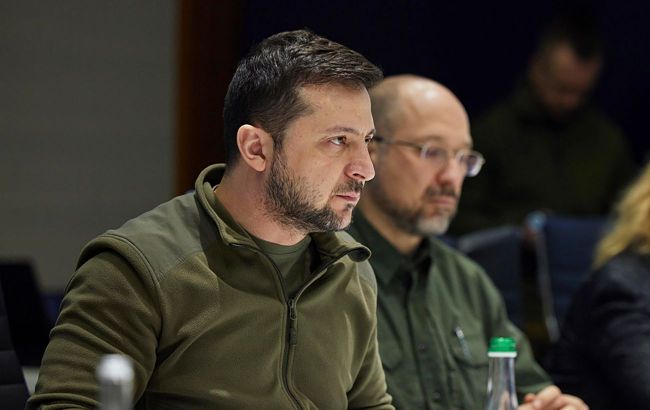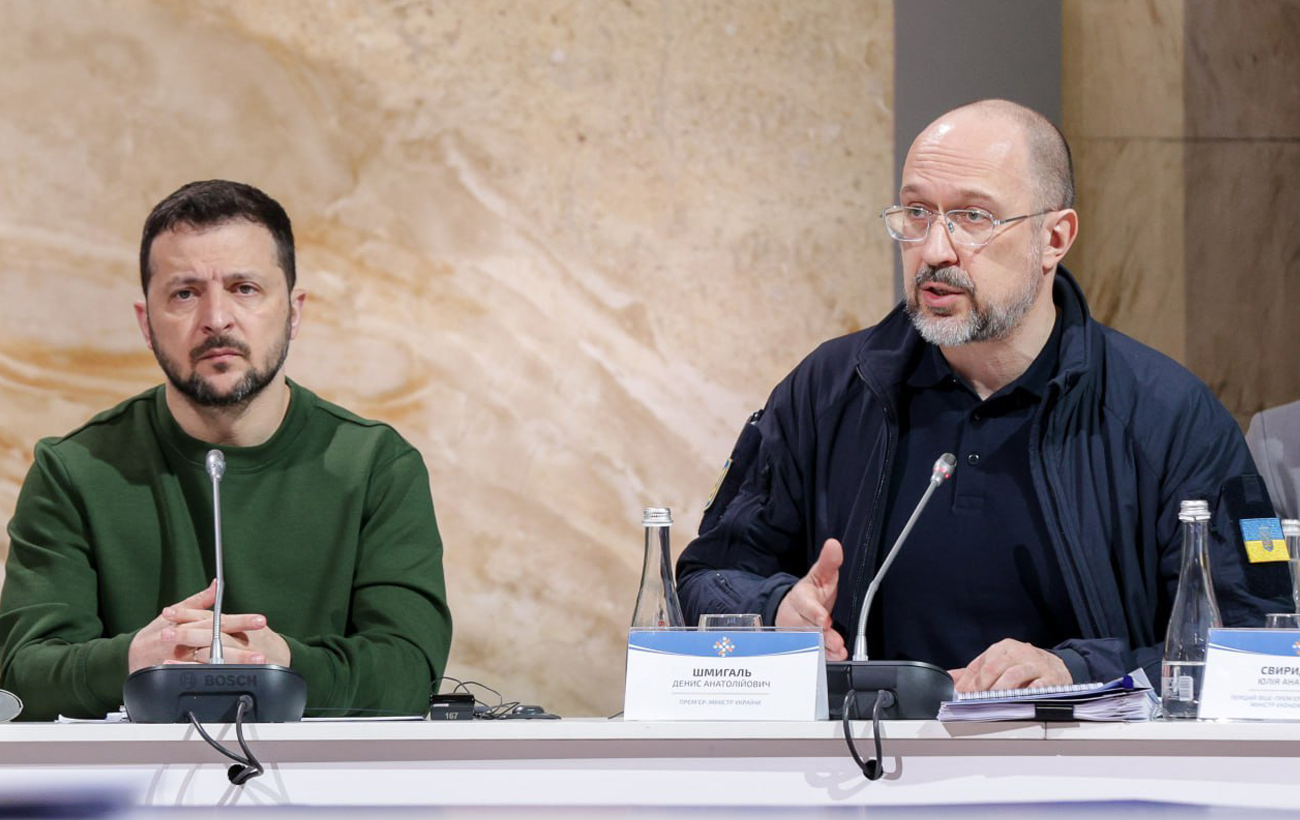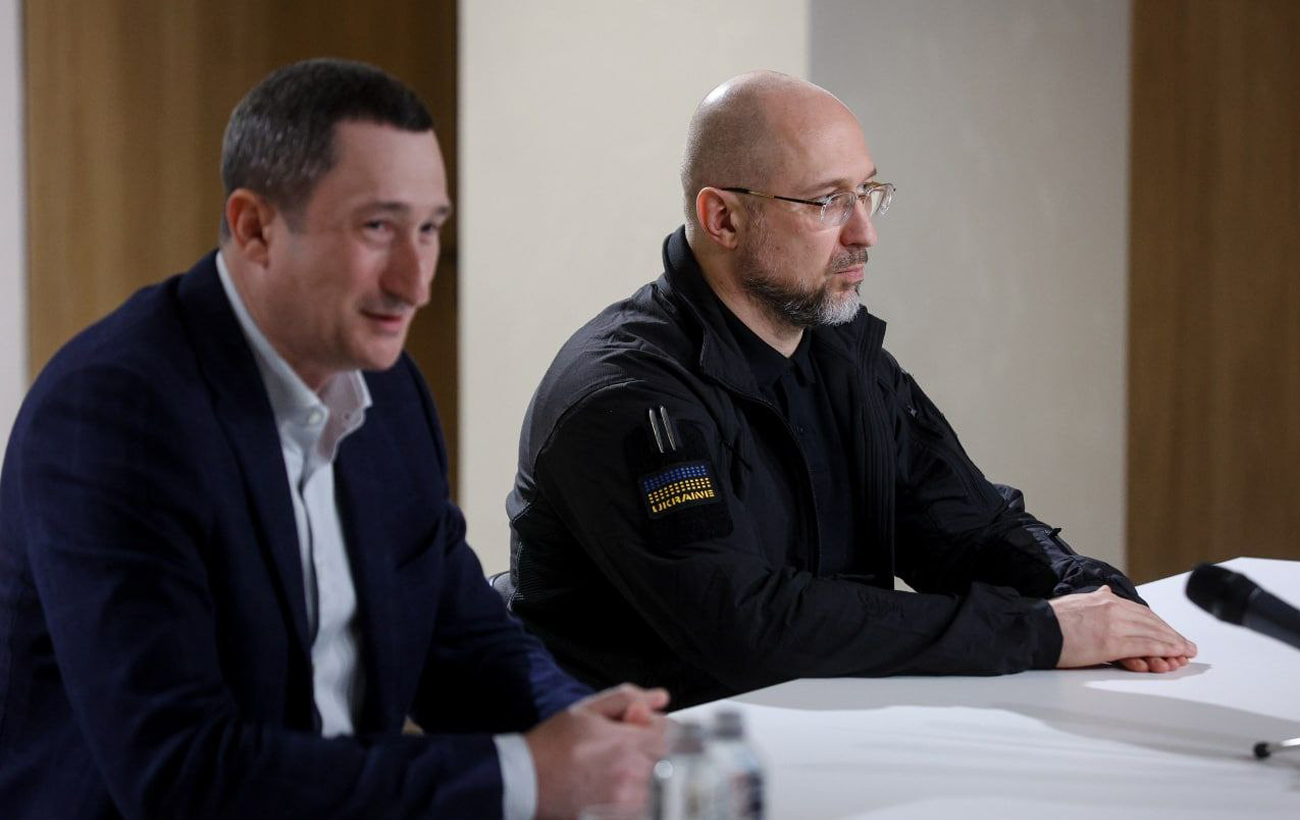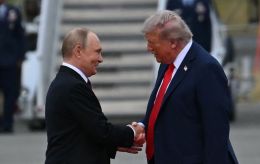Zelenskyy’s next big decision. Is it time for major government shake-up?
 Ukrainian politicians are once again talking about replacing the prime minister (photo: president.gov.ua)
Ukrainian politicians are once again talking about replacing the prime minister (photo: president.gov.ua)
Another round of premiership drama is unfolding in Ukraine — politicians are gossiping about the dismissal of Prime Minister Denys Shmyhal and several ministers. RBC-Ukraine looked into what’s behind these talks and whether President Volodymyr Zelenskyy has reasons to radically shake up his governing team.
Key questions:
- Has Zelenskyy really decided to dismiss Shmyhal, and what are the reasons behind it?
- What other reshuffles are expected in the Cabinet of Ministers — full list
- Who won and who lost the behind-the-scenes battle within Zelenskyy’s circle?
For several weeks, rumors of a major reshuffle in the government team have been circulating persistently in political circles. It all started when a few MPs and bloggers announced — almost as a done deal — that the president had decided to dismiss Prime Minister Denys Shmyhal and appoint Yulia Svyrydenko, the current Deputy Prime Minister and Minister of Economy, to the post.
Some government insiders saw signs of an information campaign against Shmyhal and initially reacted to such statements with a bit of sarcasm. Especially since similar stories have been discussed almost every summer, always ending in nothing. “Dmytro Razumkov threw out some ‘insider info,’ and those who sympathize with Yulia started pushing the topic and whispering here and there that Svyrydenko is about to become the next prime minister,” a government source explained to RBC-Ukraine a few weeks ago.
Another premiership drama?
But the rumors started to take on new, more confident forms. And the question of a possible prime ministerial resignation was posed directly to the president. At a meeting with journalists just over a week ago, Volodymyr Zelenskyy neither denied nor confirmed any intentions to change the head of government, while expressing his respect for Shmyhal.
“We’ve been working together for many years. So, I haven’t had a conversation with him (Shmyhal - ed.). I really respect him, especially for the years of full-scale war. Definitely for the experience, and just on a human level,” Zelenskyy said.
Shmyhal is indeed one of the few politicians who stayed with the president in the first hours and days of Russia’s invasion. Over many years of joint work, Zelenskyy has had little reason to question the prime minister’s role. “Denys was not always liked by Yermak, particularly because of his closeness to Arakhamia (head of the Servant of the People faction - ed.). From time to time, there was pressure on Denys,” says one of the MPs.
According to one source who spoke to RBC-Ukraine, there was indeed a conversation between the president and the prime minister last week, but it did not directly concern the latter’s resignation. During the talk, Zelenskyy informed him, among other things, of his intention to personally attend the Recovery Conference in Rome, scheduled for July 10–11, making it clear to the PM that there is no need for both of them.

Zelenskyy said that if he decides to change the prime minister, he will speak to him personally (photo: Facebook, KabminUA)
However, according to another source, the conversation actually took place some time ago. It was decided that the president, not the prime minister, would go to Rome, especially since they do not attend international events together. “This is routine, not some exceptional situation,” the source said, recalling that last year the prime minister also did not attend a similar conference in Berlin but took an active part in its preparation.
In any case, Deputy Prime Minister Svyrydenko will go to Italy with the president, which may be perceived as a presentation of a potential future prime minister to international partners. “It will be another showing for our partners,” one source suggested.
Svyrydenko, who is considered close to the head of the President’s Office, Andriy Yermak, has prime ministerial ambitions and doesn’t particularly hide them. Several informed RBC-Ukraine sources note that she had previously attempted to reach the premiership, but was held back — perhaps even by the president himself, who may not have been fully confident in her candidacy.
“Yulia sometimes has difficult communication with Cabinet colleagues, particularly with Stefanishyna, especially when it comes to our commitments to the EU. She tends to take work-related disagreements personally and assumes the position of the offended party. The president doesn’t like that,” a government insider shared.
Even during previous attempts to replace Shmyhal with Svyrydenko, RBC-Ukraine heard that the First Deputy PM takes criticism and public attacks quite hard. Yet resilience and readiness to withstand pressure are crucial traits for a head of government — a point insiders consistently stress.
“Svyrydenko is a great prime minister for the post-war period, when it will be about rebuilding, presenting to partners, and signing deals and memoranda with flair. She understands herself that for now, the prospects are rather different: lack of money, energy sector attacks, and other challenges,” one government source reflected.
Another interlocutor in the parliamentary corps highlights an important nuance that few discuss in the context of government changes. The current legislation prohibits the termination of the powers of state authorities during martial law, including the Cabinet. Since the resignation of the prime minister entails the resignation of the entire government, it is now legally impossible without amending the law. A draft law with the relevant changes (No. 13407) has already been submitted to the Rada by a group of MPs from various factions at the end of June.
Other potential Cabinet changes
In preparing this material, RBC-Ukraine spoke with many members of the ruling team, but still did not receive final confirmation that the president has already made a decision to change the head of government. Some estimate the likelihood at more than 50%, others — even 70%. But almost everyone agrees that this time, the situation looks more serious than during all previous Shmyhal resignation rumors, the first of which were discussed back in 2020.
“The issue is not really with Shmyhal, but in the general need to release steam and reduce the wave of negativity coming from all sides — the front, the attacks, everyone’s exhausted. On top of that, certain ministers create problems for the president through their actions or inaction. So, regardless of how the issue with Shmyhal ends, we’ll see some resignations either way. If not in July, then a bit later,” one influential Servant of the People MP told RBC-Ukraine.

Denys Shmyhal and Oleksii Chernyshov (photo: Shmyhal’s Telegram)
As an example, the interlocutor points to Vice Prime Minister – Minister for National Unity Oleksii Chernyshov, who almost caused a scandal upon returning from a foreign trip and was also served a notice of suspicion in a years-old corruption case. Zelenskyy and Shmyhal even had to publicly promise that Chernyshov would return.
Eventually, that’s what happened: the Vice Prime Minister managed to avoid a disgraceful search warrant or arrest. However, the reputational stain on the central government was still too visible. The fate of Chernyshov himself and possibly his entire ministry can be considered sealed. Sources in the government told RBC-Ukraine that this scandal was one of the factors that accelerated the overall reshuffling process.
“There is indeed a certain tension. And these rumors about resignations – not only of Shmyhal but of other ministers as well – are not helping the government’s work. But it’s unlikely that we’ll see any specifics before mid-July. The Prime Minister will definitely not be dismissed before the Recovery Conference, and beyond that – no guarantees,” one government official told the outlet.
Sources name several ministers who are frankly “on their way out” regardless, due to lack of results (as seen from the President’s Office), criticism from their respective sectors, scandals, or all of the above. Minister of Education Oksen Lisovyi and Minister of Social Policy Oksana Zholnovych may lose their portfolios – according to RBC-Ukraine’s sources, even MPs have plenty of complaints about them.
Potential reshuffles in the Ukrainian government, of course, have stirred notable interest among EU officials, which likely also influenced the timing. In Brussels, RBC-Ukraine heard complaints about the dismissal of key Ukrainian officials – Deputy Prime Minister for Restoration Oleksandr Kubrakov and the head of the relevant agency, Mustafa Nayyem – shortly before last year’s Ukraine Recovery Conference. EU representatives note that this definitely did not help the cause, so this year they hope that any significant changes will happen only after the Rome conference.
Several interlocutors from the Servant of the People party said that MPs were initially supposed to be gathered to vote on personnel issues on July 7–8. But when it became clear that neither the MPs nor the votes could be gathered on those dates, the matter was reportedly postponed until at least July 15–17, a source noted.
“For now, the situation has calmed down, but it hasn’t been resolved. The conversation may resume in mid-July,” another government insider confirmed.
There are several configurations of how events might unfold. If Shmyhal resigns, there is only one option for the premiership – Svyrydenko. But for other ministers, there are significantly more options.
“Svyrydenko’s place in the Economy Ministry might go to Oleksii Kuleba (Deputy Prime Minister for Recovery), or he might be appointed to the Energy Ministry if Halushchenko is dismissed. Mykyta from the President’s Office might take over the Recovery Ministry instead of Kuleba. But right now, this configuration is highly uncertain,” an informed source said.

Yulia Svyrydenko (photo: RBC-Ukraine, Vitalii Nosach)
For now, no talk of replacing Defense Minister Rustem Umerov, despite rumors of his possible reassignment to diplomatic work. There will be some changes in the diplomatic corps, although it’s unclear when exactly. It is almost certain that Ambassador to the US Oksana Markarova will complete her term – her relations with the new Trump administration didn’t work out.
“At first, the plan was to send Umerov to replace Markarova – he’s perceived very positively by the current Trump team. On the other hand, that advantage is also needed in his current position. So, as I understand it, they’ve decided to abandon that idea,” another source in the administration said.
According to RBC-Ukraine, another option is now under consideration at the President’s Office: sending the current Minister of Culture, Mykola Tochytskyi, to Washington, who allegedly would not mind returning to diplomatic service.
Decisions have not yet been made regarding several other ministers. For example, the future of Health Minister Viktor Liashko is unclear – he reportedly wants to resign after four years in office. The fate of the current Minister of Youth and Sports, Matvii Bidnyi, is also uncertain. There are also rumors about a possible appointment of Budget Committee head Roksolana Pidlasa as Minister of Finance, replacing Serhii Marchenko. However, as one Servant of the People source said, Western partners and donors are categorically opposed to his dismissal.
Changes are also being discussed in the Ministry of Veterans Affairs, led by Natalia Kalmykova. “On the one hand, Kalmykova supposedly isn’t delivering results the way they’re expected. On the other hand, there seems to be an understanding that the problem isn’t in the name – many have been appointed to that ministry, and nothing has worked out,” one RBC-Ukraine source in the government said.
Two of the outlet’s sources also mentioned the possibility of transferring Interior Minister Ihor Klymenko to the post of Deputy Prime Minister, though they noted that this decision is not final.
Some changes may also occur at the level of parliamentary committee chairs, though such changes likely won’t get much attention compared to major government reshuffles.
***
RBC-Ukraine did not hear any specific, objective reason from its sources as to why the government needs to be changed, and why now. Or rather, it heard about other reasons – namely, the ongoing power struggle among various influential figures in the President’s circle. And, as in almost every previous round, this one has so far been won by the head of the President’s Office, Andriy Yermak.
On the one hand, he apparently finally managed to break the resistance that the head of the Servant of the People faction, Davyd Arakhamia, had put up for years against Shmyhal’s dismissal (and who had largely saved the Prime Minister from resignation). “Yermak wore down Davyd. Or rather, Davyd allowed himself to be worn down – that’s more accurate,” an informed source said. On the other hand, no final decision on Shmyhal has been made yet, so it’s too early to declare Yermak’s victory as a done deal.
In parallel, Andriy Yermak has managed to edge out a longtime presidential friend – a less public but influential businessman and co-owner of Kvartal 95, Tymur Mindich. Some of the officials now at risk of dismissal are believed to be close to Mindich – for example, Minister of Agrarian Policy Vitalii Koval, who is also facing questions from the agricultural sector.
A new season of the premiership drama has begun despite the difficult situation at the front, the uncertain outlook for foreign aid next year, and the complete lack of clarity about preparations for the heating season should the energy infrastructure come under renewed attack. External and internal risks may ultimately keep Volodymyr Zelenskyy from making a final decision on reshuffling the government, at least until calmer times.
Written by Milan Lelich, Uliana Bezpalko, Rostyslav Shapravskyi

